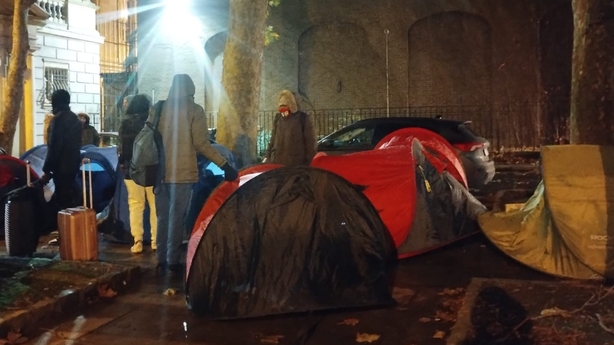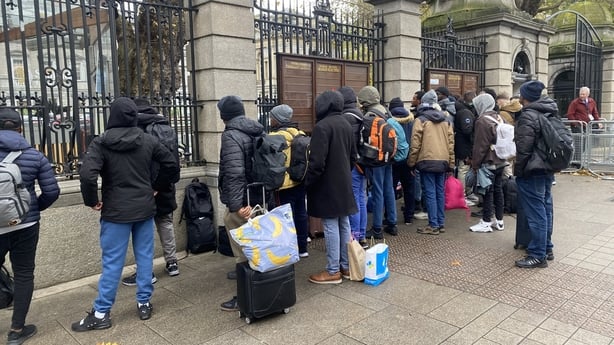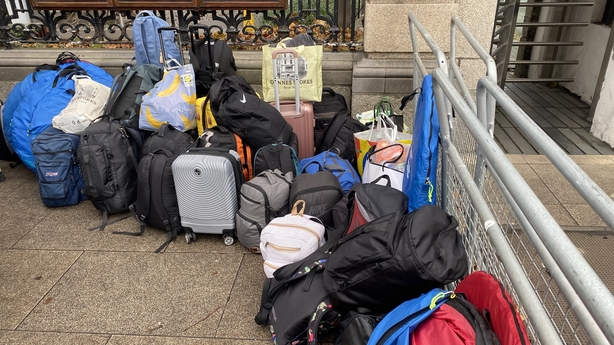Dozens of male international protection applicants are sleeping rough in Dublin city centre tonight, after they had to leave temporary accommodation offered to them during cold weather.
More than 30 asylum seekers have pitched tents in a square off Kildare Street, beside the Department of Agriculture and just a few meters from the Dáil where they held a day long protest.
Yesterday, they received emails telling them that "as the cold weather has passed" their "temporary placement" was coming to an end and they had to leave the Citywest accommodation centre by 10am today.
The Department of Integration told RTÉ News that its cold weather response, which came into effect on 15 November, has now concluded.
As part of the cold weather response, rough sleeping unaccommodated international protection applicants and new arrivals who sought international protection on or since 15 November were offered temporary accommodation.

Last week, the men were informed that the temporary accommodation offer was coming to an end, but this decision was then reversed.
Confirming its decision to conclude its cold weather protocol today, a spokesperson for the Department said that "IPAS will continue to monitor weather forecasts and our cold weather response plan will be reactivated if extreme weather warnings issue".
Footage seen by RTÉ News, that was recorded this morning and last week in the Citywest accommodation centre, shows a number of empty beds.
"We have so many vacant beds (in Citywest) here so we are surprised, the place isn't even full, and they still want (us) to vacate, but there's nothing we can do except to beg them and to plead with them" one of the men said to RTÉ News.
In response a spokesperson for the Department of Integration said: "In order to prioritise people with families or who are identified as vulnerable on assessment, a limited number of beds are kept available.
"It is also important that temporary capacity is maintained to allow (the International Protection Accommodation Service) IPAS provide short-term accommodation in response to extreme weather events, such as those we have seen in recent weeks."
This morning those with "temporary cold weather" accommodation offers were instructed to leave the the Citywest accommodation centre.
The group who gathered at the Dáil carried with them their belongings in suitcases, backpacks and plastic bags, while volunteers arrived with a small number of tents.
The men made signs out of cardboard with slogans including "please we need accommodation" and "we need a place to sleep".
One man told RTÉ News that he arrived in Ireland two months ago and had been sleeping rough before he was offered accommodation in Citywest three days ago.
"Unfortunately yesterday I received another message that I have to leave the Citywest after just three nights," he said.
"We don't have any place to go, we are only pleading with the Government to please provide accommodation for us," he said.

He expected to sleep rough again tonight.
"That's what I have been doing for the past two months, its not new for me," but he said "there are a lot of dangers... there was even a night when I was sleeping in front of the General Post Office (GPO), someone just came to urinate on my body and I cannot do anything."
While rough sleepers are among those who have lost their temporary accommodation in Citywest, the Department of Integration has said that there is a process in place to identify and offer accommodation to rough sleeping unaccommodated asylum seekers, although once more this accommodation offer would only be temporary.

This is a change from last month, when on 19 November the department confirmed that has partnered "with a homeless charity [which is Tiglin] to provide a nightly outreach service to identify people in need of accommodation".
It said it was "able to make offers of accommodation to international protection applicants found actively rough sleeping in the Dublin area" and it would "continue to work with our partner agency to identify people who are rough sleeping and make an offer of accommodation to them".
However a similar statement issued this week saw a change in the language used, with the department now saying it can offer rough sleepers only "a temporary offer of accommodation", which leaves open the possibility that any new offers may be brought to an end at a future date.
"They have already been through this process once before and were put into the (accommodation) system as rough sleepers or people who have just arrived with no alternative accommodation," said volunteer Olivia Headon.
"Why do they have to present again as rough sleepers in order to be put back into the system?"
"Its quite confusing" one asylum seeker said, "if you put people (into accommodation) to reduce the homelessness on the streets, one would expect that you don't increase (the homelessness) again by putting people out of the shelter."
It is exactly a year since the State ceased offering accommodation to all newly arrived international protection applicants citing a "severe shortage" of accommodation.
Women and children, men who are deemed "vulnerable" when triaged on arrival, are currently offered accommodation by the State.
There are currently 3,001 male asylum seekers who have not been offered any state accommodation, and this is a record high.
International protection applicants who are not provided with State accommodation receive an additional €75 per week, bringing the weekly amount they receive from the State to €113.80.
Labour leader Ivana Bacik spoke with some of the homeless asylum seekers protesting outside the Dáil, and said she was "deeply concerned" about the matter.
"I'm deeply concerned that this group of men has been turned out of Citywest and has nowhere to sleep, no accommodation, no alternative space," Ms Bacik said.
"I have already got on to IPAS (the International Protection Accommodation Service) to see if secure alternative accommodation even (State-provided) tented accommodation for men who are just otherwise forced to sleep in the cold on the streets, in parks, along the canals and public places, its just not acceptable."







